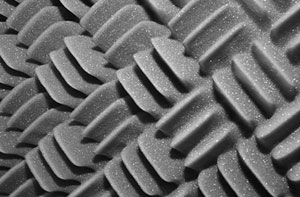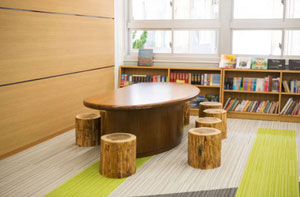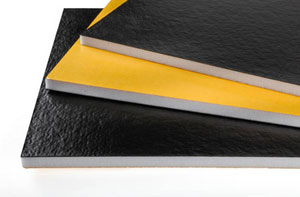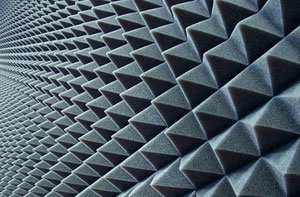Soundproofer UK: If excessive noise is plaguing your UK home, it may be prudent to explore the possibility of soundproofing to restore serenity to your living space, studio, home office, or bedroom. In certain situations, you might be considering soundproofing to ensure that your activities, such as playing music, do not disrupt others in neighboring rooms, such as children's bedrooms or a home cinema. Regardless of your specific needs, soundproofing offers a valuable solution that can provide you with the peace of mind and tranquillity you seek. It's an investment in your overall well-being, helping you maintain your sanity and create a more harmonious and comfortable living environment.
First it would be a good idea to discover just how sound travels and is transmitted before we are able to find ways to eliminate any excessive noise intruding into or escaping from your property.

Sound can travel in a couple of ways:
1. Through the vibration of objects or materials.
2. Through the air by vibration of air molecules.
As dolphin and whale songs can show, sound also travels through water, but unless your aim is to soundproof a pool or aquarium we will look only at the techniques of soundproofing buildings and rooms.
SOUND THROUGH THE AIR
When you inspect the room you intend to soundproof and observe elements like heating ducts, poorly fitted windows, gaps around doors, and even electrical switches and sockets, it becomes evident that these factors contribute to sound transmission issues. Sound, regardless of its source – whether it's music, aircraft, traffic, heavy machinery, or children playing – originates from the same basic principle: the vibration of air molecules. This vibrational movement is what we perceive and interpret as sound. Identifying and addressing these various sources of sound transmission is crucial in achieving effective soundproofing, as it helps create a more peaceful and noise-resistant environment in your space, regardless of the specific noise source you're dealing with.
If you can visualise your room as a bucket, and you are trying to identify any leaks which need sealing before you can fill it with water.
SOUND THROUGH STRUCTURES AND OBJECTS
It's a well-understood fact that sounds are merely vibrations of air that reach our ears, yet it's important to note that these vibrations don't just travel through air; they are also absorbed and transmitted by solid objects. The floors, ceilings, and walls within your rooms will not only absorb these sound vibrations but can also cause them to resonate, potentially extending the sound beyond the confines of the room. Furthermore, even in spaces constructed from materials highly resistant to vibrations, such as cellars lined with concrete, there exists the possibility for sound to be reflected and, in some cases, even amplified, thereby dispersing it to other areas of the building. This phenomenon highlights the complex nature of sound transmission and the challenge of soundproofing in various environments.
How should we stop these sounds and vibrations from having an adverse effect on other people? Soundproofing is the solution.
SIMPLE STEPS IN SOUNDPROOFING
Think about covering bare floors, which reflect and resonate sound, with a rug or carpet. The rugs or other soft coverings will help to absorb noise and can also add a bit of elegance to a previously bare room. Window drapes and wall coverings can also be employed to enhance soundproofing and are easy to install and maintain.

Finding and plugging any holes or gaps in the rooms, think sockets, windows, doors and light fittings, is also a simple task for a competent do-it-yourselfer. Stopping up the gaps and holes with a specialist acoustic sealant found in many DIY and building material shops, can make an enormous difference to sound transmission in your room. Acoustic sealants are inclined to be a bit more expensive than normal plaster or other sealant products, however their remarkable soundproofing qualities far outweigh the small extra cost.
For anybody renovating a property or redecorating a room, look at the soundproofing benefits of adding a supplementary layer of soundboard or plasterboard, (also known as sheet rock, gypsum board or drywall), whilst you are carrying out the work. This is an economic and efficient soundproofing material because of its dense nature. If you are putting in a games room, home cinema or home office then plasterboard can help to minimise sound transmission from and to that room, and can be decorated easily after completion. If you do decide on plasterboard to aid your soundproofing it is advisable to bring in a specialist fitter in UK, to gain the maximum possible benefit from its installation.
One final easy soundproofing treatment is to examine the materials from which your doors are made. Hollow doors are fairly cheap but their soundproofing qualities are a far cry from perfect. If you are able to change to solid wood doors you will discover that it boosts your soundproofing more cheaply than some other options.
PROFESSIONAL SOUNDPROOFING SOLUTIONS UK
Some properties, for instance those beside busy roads or on aircraft flight paths, have naturally more issues with sound pollution and will need other ways to address the situation. You will get the best possible soundproofing results by employing the services of a professional soundproofing specialist.

The first questions you should be asked are:
- What sounds or noise are you looking to subdue? i.e. External factors like passing trains, noisy neighbours, road noise etc, or sounds inside your property from a home cinema or teenagers bedroom.
- Exactly where is the primary source of the noise emanating from? i.e. Overhead, through the floors, doors, walls, ceiling or windows, or a combination of all sorts of things.
- What is the area you wish to soundproof constructed from? (i.e. a stud partition wall, a brick wall or a lined concrete wall).
- How large is the room you need to be soundproofed?
Your answers to such questions will enable you to get estimates for the various available solutions that match your needs. They will provide different strategies to soundproof each of the main trouble spots within your home.
PROFESSIONAL SOUNDPROOFING OF WALLS, FLOORS and CEILINGS
To soundproof any type of room requires two key approaches:
- Reduce the effects on the way sound is transmitted through and reflected by solid surfaces.
- Increase sound absorption.
Doing this requires a site survey to verify which areas require developing from the current state.
Solutions from the survey will probably include adding some materials with different densities to help boost the soundproofing capabilities of the area. Soundproofing will be improved by the application of acoustic foam and rubber which absorbs sound waves and improves and the sound quality of a space.

Any noticeable voids in the area may need some form of muffling material to be installed between them to lower noise resonation. If you visualise a drum for instance, you are looking at a sound increasing void surrounded by a resonating material; essentially what you may find inside ceiling and floor joists, or cavities in walls.
Mixed layers of differing density and mass materials do a better job of absorbing sound than a solitary layer of one material type. This is because different materials react in different ways with different frequencies and will deliver a much better solution to your soundproofing.
Any soundproofing company in UK will have to conform to the the Building Regulations (Part E), if dealing with a residential property. This set of regulations is a requirement in law to protect your neighbours and yourself from the negative effects of noise pollution in a setting where people work and live.
Trade bodies in the soundproofing industry that offer advice, training and qualifications are the Institute of Acoustics and the Association of Noise Consultants. Only those UK businesses that have been appraised and approved by these associations for reliability, professionalism and quality are permitted to bear the logo.
UK Soundproofing Tasks

There is a variety of work that can be accomplished by your local UK soundproofer including noise reduction, soundproofing solutions, soundproofing doors, residential soundproofing UK, echo reducing, acoustic services, soundproofing in UK, soundproofing consultations UK, soundproofing rates UK, noise cancellation, room soundproofing services, soundproofing insulation, floor soundproofing services UK, sound insulation, soundproofing surveys UK, soundproofing windows UK, soundproofing ceilings UK, music room soundproofing UK, soundproofing supplies UK, and more.
Other Tradespeople in UK

Naturally, when you happen to be doing home repairs and improvements in UK, UK, you will likely need all sorts of different tradesmen and along with a soundproofing specialist in UK, UK, you might also need a plasterer in UK, a plumber in UK, a carpenter in UK, a window fitter in UK, a floor fitter in UK, a tiler in UK, a building contractor in UK, metalworkers in UK, a handyman in UK, a bricklayer in UK, a cleaner in UK, an electrician in UK, rubbish removal in UK, a decorator in UK, and other different UK tradesmen.
 Soundproofing UK
Soundproofing UK Soundproofing Near Me
Soundproofing Near Me Soundproofers UK
Soundproofers UKMore soundproofing specialists: Noise Reduction Services, Noise Reduction Services, Noise Reduction Services, Sound Insulation, Noise Control, Noise Prevention, Sound Muffling, Soundproofing, Soundproofing Specialists, Soundproofing Experts, Noise Reduction Specialists, Noise Reduction Specialists, Soundproofers, Sound Muffling, Soundproofing Services, Soundproofing Services, Soundproofing, Noise Control Services, Noise Control, Soundproofers, Soundproof Rooms, Soundproofing, Noise Elimination, Noise Reduction, Soundproofing Services, Soundproofers, Cheap Soundproofing, Noise Muffling, Noise Reduction, Soundproofing Solutions, Soundproofing, Soundproof Rooms, Cheap Soundproofing, Soundproof Rooms, Soundproofing Firms, Noise Elimination, Noise Control, Cheap Soundproofing, Noise Prevention, Sound Insulation, Soundproofing, Sound Muffling, Sound Insulation, Soundproofing Solutions, Soundproofing Companies, Noise Reduction Services, Soundproofers, Soundproofing Specialists, Soundproofing Firms, Soundproofing Companies.
Ceiling Soundproofing Services - Soundproofing Services - Cheap Soundproofing - Soundproofing Quotations - Soundproofer - Soundproofing - Floor Soundproofing - Residential Soundproofing



